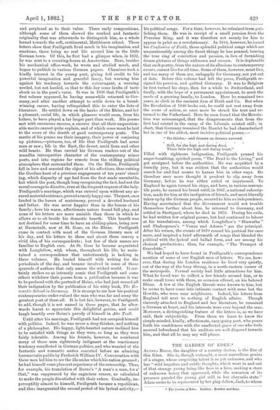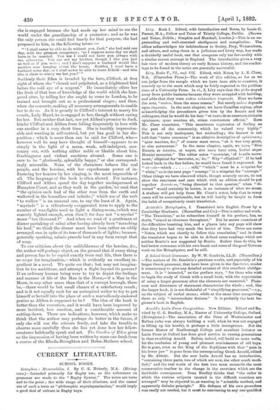THE GARDEN OF EDEN.*
ALTIIEA Bum., the daughter of a country doctor, is the Eve of this Eden. She is, though untaught, a most marvellous genius of a singer, whose surprising talent is as yet unknown, and who has "wild impulses and subtle thoughts, which went in and out of that strange young being like bees in a hive, making a store of unknown honey that oppressed, while the sensation of its presence puzzled the young girl still in her chrysalis state." Adam seems to be represented by her play-fellow, Jack, to whom • The Garden of Eden. London: Bentley and Sone.
she is engaged because she had made up her mind to see the world under the guardianship of a protector ; and as he was the only person she could find handy for that purpose, she had proposed to him, in the following terms
shall never be able to do without you, Jack," she had said one day, with the greatest composure; 'so I suppose some day we shall have to be married. You see I could not have you always with me, otherwise. You are not my brother, though I like you just as well as if you werv ; and I don't suppose a husband would like another man hanging about the house. Besides, I must have a husband some day, or I shall never be able to leave Elfield—and who else is there to marry me but you I"" Suddenly their Eden is invaded by the hero, Clifford, at first sight of whom she "shrank and palpitated, as a frightened bird before the cold eye of a serpent." He immediately offers her the fruit of that tree of knowledge of the world which she hun- gered after, by telling her she ought to come to London, to be trained and brought out as a professional singer ; and then,
when she consents, making all necessary arrangements to enable her to do so. As it is greatly to Clifford's interest to marry his cousin, Lady Maud, he is engaged to her, though without caring for her. But neither that fact, nor yet Althea's promise to Jack, hinder Clifford and Althea from falling desperately in love with one another in a very short time. She is terribly impression-
able and wanting in self-control, but yet has good in her dis- position; which is more than can be said for Clifford, who— however well he may have thought of himself—appears to us
simply in the light of a mean, weak, self-indulgent, mer- cenary cur, with nothing either noble or likable about him.
Gnshingness and violent emotions abound. Some one is sure to be "gloriously, splendidly happy," or else correspond- ingly miserable. None. of the characters behave like real
people, and the heroine, with her superhuman power of in- fluencing her hearers by her singing, is the most impossible of all. The language of the book is often absurd. For instance, Clifford and Althea spend the day together unchaperoned at Hampton Court, and as they walk in the garden;we read that "the opinion each had of the other rose from the earth and wallowed in the boundless and infinite ;" which use of the verb "to wallow" is an unusual one, to say the least of it. Again, "myriads " is a ridiculously exaggerated term to apply to the
number of wax-lights used to light a dining-room, (which was scarcely lighted enough, even then !) for does not "a myriad" mean "ten thousand ?" And when we read of a gentleman at dinner partaking of salmi after having already been munching his beef," we think the dinner must have been rather an oddly
arranged one, in spite of its tens of thousands of lights ; because, generally speaking, salmis precede beef in any form except that of soup.
To our criticism about the unlifelikeness of the heroine, &c., the author will perhaps object, on the ground that if every thing and person has to be copied exactly from real life, then there is no scope for imagination,—which is evidently an excellent in- gredient in a novel. We quite see that ; but may not imagina- tion be too ambitious, and attempt a flight beyond its powers?
If an ordinary human being were to try to depict the feelings and manner of life of the Man in the Moon,—if a Man in the Moon, in any other sense than that of a corrupt borough, there be,—there would be but small chance of a satisfactory result ; and is it not equally rash for an uninspired writer to try to put himself or herself into the place of such a marvellously-endowed genius as Althea is supposed to be ? The idea of the book is better than the execution, and it would have been improved by more incident, less emotion, and a considerable amount of cutting-down. There are indications, however, which make us think that the author may perhaps do better in the future, if only she will use the scissors freely, and take the trouble to observe more carefully than she has yet done how her fellow-
creatures habitually speak and act. The Garden of Eden gives us the impression of having been written by some one fresh from
a course of the Rhoda-Broughton and Helen-Mathers school.















































 Previous page
Previous page